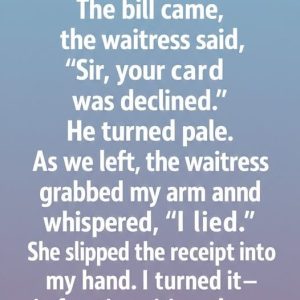My aunt worked for a high-end luxury brand, the kind where a scarf could cost more than my monthly rent, and one day she sent me her employee discount code. She warned me not to share it, saying it was just for me, and I promised I wouldn’t. I used it once on a small purchase, felt a fleeting sense of luxury, and then forgot about it. But two weeks later, my phone rang, and her voice was trembling. Her account had been suspended because the company suspected her of reselling items after flagging multiple orders made with her discount. My stomach sank when I opened my email and saw a $1,200 order under my name and email but shipped to an address I didn’t recognize. It clicked that Marla, a friend I’d casually mentioned the code to in conversation, must have used it. I hadn’t given her the code directly, but my careless suggestion had provided enough information for her to exploit it.
I called Marla to confront her, and at first, she downplayed it, claiming she had only used the code once and hadn’t resold anything. When I explained the seriousness of the situation—that my aunt’s career was at risk and her account had been suspended—she shrugged it off and suggested my aunt shouldn’t have shared the code in the first place before hanging up. Shocked and feeling responsible, I drove to my aunt’s house the next day. She looked exhausted, with makeup smudged and hair in a messy bun, overwhelmed by the implications for her job and reputation. I admitted my role in the situation, explaining the conversation with Marla and how it led to the flagged orders. She listened silently, saying that while she appreciated my honesty, the suspicion on her account might already have done irreparable damage. Despite my offers to go with her to HR, she insisted it was already in the system, and their trust in her might never fully return.
Determined to make things right, I created a new email account and wrote to the company’s HR department, explaining everything without using my real name. I detailed how I had carelessly mentioned the discount code to Marla and provided all the evidence, including screenshots of our conversations and order receipts, to prove my aunt’s innocence. I sent it and waited anxiously, feeling a mixture of dread and relief for finally owning up. A week later, my aunt texted that her account had been reinstated and that the investigation was being reopened. When I admitted to her what I had done, she sighed and expressed gratitude, though we didn’t speak much afterward. The awkwardness lingered, a fragile barrier between us that took time to heal, even as I felt the weight of my mistake lifting slightly.
Unexpectedly, I was invited to meet HR in person. I expected a reprimand but was met with genuine interest and a request to explain everything. They listened carefully, asking me about my actions, intentions, and understanding of the situation. Afterward, they acknowledged that most people don’t take responsibility like I had and appreciated my honesty. To my surprise, they offered me a chance to join a program for younger creatives in digital, social media, and content support. Though I initially doubted whether I deserved it, I accepted. Over the next three months, I learned the intricacies of campaign planning, influencer strategy, and social media management. I gained a new appreciation for my aunt’s work, seeing her department mentioned in strategy meetings, and learned firsthand the care required to maintain brand reputation. Meanwhile, my aunt retained her job, eventually moving to a different department, and slowly, our relationship began to thaw.
Months later, I encountered Marla again at a coffee shop. She looked worn and admitted she had been fired after her online reselling activities were traced back to her. Our exchange was brief and tinged with quiet irony, as life seemed to have delivered its own form of justice. Meanwhile, my career had taken a completely different path. The company offered me a full-time position, with my aunt mentoring me before transitioning into a new branding role. Standing beside her, I reflected on how close I had come to jeopardizing everything she had built. We joked about how my mistake inadvertently led me to the opportunity of a lifetime. The experience became a lasting lesson: protecting someone’s trust matters more than fleeting excitement, honesty after failure can start the repair process, and the “friends” who ignore the consequences of their actions were never true friends. Most importantly, I learned that owning up to mistakes, even when terrifying, can unexpectedly open doors, and that the value of a chance, discount, or secret is often much greater than we realize.





